
Guests
- Vladimir Carrascodirector of climate justice at the Coalition for Humane Immigrant Rights.
- Veronica Ocasiodirector of education and programming at the National Museum of Puerto Rican Arts and Culture in Chicago.
The Trump administration’s immigration crackdown is sowing fear and chaos in communities across the United States, as heavily armed and masked agents descend on workplaces, schools and public spaces. In Los Angeles, dozens of federal agents, including some on horseback, swept MacArthur Park, located in a predominantly immigrant and working-class part of the city. “It felt like an occupation of L.A.,” says Vladimir Carrasco, who works with the Coalition for Humane Immigrant Rights, or CHIRLA.
Meanwhile, community leaders in Chicago are expressing outrage after federal immigration forces showed up at the National Museum of Puerto Rican Arts and Culture and refused to identify themselves. Although Homeland Security later claimed the agents were at the museum on an unrelated matter, “We know that they were there to intimidate us,” says Veronica Ocasio, director of education and programming at the organization. Puerto Ricans are U.S. citizens.
Transcript
NERMEEN SHAIKH: From immigration agents swarming MacArthur Park in Los Angeles to a Chicago museum ahead of a cultural festival, we’ll begin today looking at how communities are dealing with the immigration crackdown.
On Monday, at least 90 heavily armed federal immigration agents, some on horseback, staged a dramatic sweep on a Los Angeles public park, enflaming tensions in a city already on edge from the Trump administration’s mass raids. Mayor Karen Bass arrived on the scene, where she told agents to leave MacArthur Park, a popular public space in a largely immigrant and working-class neighborhood, where many children were playing. Activists and community members, some who had been tipped off about the sweep, were seen repelling the agents, yelling insults at the armed and masked men, some hurling fruit towards them. Mayor Bass later condemned the incident.
MAYOR KAREN BASS: While I was on the way, though, I got alerted that there was a ICE operation, military intervention — who knows? — at MacArthur Park. I turned around. We went to the park. I could see a helicopter in the air. I think it was a Black Hawk helicopter. And I saw military tanks. It was the Custom and Border Patrol, and it might have been military on the periphery. To me, this is another example of the administration ratcheting up chaos by deploying what looked like a military operation in an American city. … So, what I saw in the park today looked like a city under siege, under armed occupation. And I have to tell you, spending many years traveling into conflict areas, you know, it’s the way the city — it’s the way a city looks before a coup.
AMY GOODMAN: This comes as the Department of Homeland Security says ICE and Border Patrol agents have detained nearly 3,000 people in Los Angeles since June 6th.
For more, we’re joined by Vladimir Carrasco. He is director of climate justice at the Coalition for Humane Immigrant Rights, known as CHIRLA. He was one of the first responders who went to the park, and has been at other ICE raids.
In a moment, Vlad, we’re going to go to Chicago to find out what happened in the last few days, but we want to start with these immigration agents on horseback. You were one of the first in the park. Explain what took place.
VLADIMIR CARRASCO: Yeah, I would also like to provide a little bit of context, that this is not only 33 days into the siege in L.A. by federal enforcement. It was also the exact six-month anniversary of the recent wildfires that impacted the same city. The Eaton Fire claimed 19 lives, and out of those 19, 90% were Black families. And still to this day, they’re struggling to recover. And instead of federal aid and assistance, you know, what we’re getting is now the terrorization of this federal — of these federal agents.
So, yeah, I live nearby MacArthur Park, and I heard the — I first felt the vibration, and then I heard this deep rumbling, and that was a heavy military helicopter circling Koreatown, Little Bangladesh, MacArthur Park area. This is a mostly immigrant, working-class community. So, it is clearly — it was clearly, evidently, from just my first arrival in the park, that this is a highly orchestrated distraction, a display. There was no real investigation or arrest or operations.
When I arrived, the National Guard — the National Guardsmen and officers looked kind of dejected and unclear of, like, what they were really doing there. And the CBP officers, the federal enforcement officers, were already agitated. They were coming in — right? — with this vicious energy against the community. At one point, one officer had even had to be pulled back by their vest, and this person was carrying a machine gun. And I’m like, if this person with a gun, federally trained officer with a gun, is already coming into the community agitated, I can’t imagine the horrors that are going to be coming forward if this continues, right? This park is a community park, a hub of vendors. There were children in the park right before this enforcement happened. So, really, it was just bizarre to see as just being in my community, that is a normal — what should be a normal day, buzzing with people, was a desolate park filled with military officers. And yeah, similarly how it has been described, it felt like an occupation of L.A.
And this isn’t just about immigrants. The heat map that CHIRLA has put out of immigration enforcement within June has shown that the highest concentration of enforcement has been in Black and Brown communities. So, this is destabilizing not only immigrant communities. This is destabilizing Black communities. This is destabilizing our city’s economy. And now with this proportion — this purported idea of safety now, we are really less secure, because the only gang roaming around L.A. kidnapping people is the federal agents.
And out of the, my god, nearly 3,000 people kidnapped by ICE, we are barely in touch with 400. We’re being able to track 400, given that families are reaching out, hitting up the rapid response line, but it’s really because of community outreach that we’ve been able to identify those folks. Federal enforcement agents are making it extremely difficult for even attorneys or family members to access folks that have been detained, folks that are detained. Family members are reaching out to us because they’re missing. So, we don’t even know if they’re in the system. And then, when we do make the effort to look for them, that’s how we’ve been able to find them. And out of the 400 we’re tracking, we’re in touch — we’ve been able to get in touch with, and even a fraction of that. So, this is really a detrimental move on American values and on our rights —
NERMEEN SHAIKH: Well, let’s go now —
VLADIMIR CARRASCO: — the rights of all people.
NERMEEN SHAIKH: Vlad, let’s go to Chicago, where staff members of the National Museum of Puerto Rican Arts and Culture confronted federal agents Tuesday. Museum officials say Homeland Security vehicles and federal agents, mostly in plainclothes, came to the museum Tuesday around 4 p.m. and refused their request to show them a warrant or any identification. Footage from museum surveillance cameras shows two agents entered the museum and asked to use the bathroom, before they walked around the museum. This all comes before the museum is set to host the Barrio Arts Fest this weekend amid mounting fears ICE could target the event, as well as other upcoming cultural events celebrating Chicago’s Latinx communities. After the agents left, museum officials joined lawmakers at an emergency press conference. This is Illinois Congressmember Delia Ramirez.
REP. DELIA RAMIREZ: And I want to make sure that it’s clear, whether it’s Barrio Fest, Colombian Fest, Mexican Independence Day Parade, Bandera a Bandera, when we have our art festival at the beginning during Labor Day, the people here will continue to stand in solidarity. And here’s what we’re also going to do. We’re going to make sure at the city and the state level, you’re going to legislate, what we can’t legislate in the same way [inaudible]. And then we’re going to also make sure that our attorney general has the support, and others, as we’re taking legal action and elevating them, because what this administration is doing is violating the Constitution.
AMY GOODMAN: So, the Department of Homeland Security responded in a statement to Congressmember Ramirez, who we just heard, and museum officials, writing, quote, ”FALSE. The Department of Homeland Security DID NOT target the National Museum of Puerto Rican Arts & Culture. On July 8, HSI Chicago’s Financial Crimes Task Force (FCTF) staged and held a quick briefing in the Museum’s parking lot in advance of an enforcement action related to a narcotics investigation,” DHS wrote. Congresswoman Ramirez then responded to DHS in a statement, saying, quote, “Once again, agents of DHS — and let’s be clear that HSI agents work within ICE and are agents of DHS — should identify themselves, like every law enforcement official is required to do. And in case [DHS Secretary Kristi] Noem and DHS’s spokesperson forgot, the office of Homeland Security Investigations [HSI] is under ICE according to their own website: Homeland Security Investigations | ICE,” Ramirez said.
For more, we’re joined in Chicago by Veronica Ocasio, director of education and programming at the National Museum of Puerto Rican Arts and Culture.
Welcome to Democracy Now! Let me remind everyone that Puerto Ricans are U.S. citizens. If you can talk about what this means, what happened on Tuesday to your museum?
VERONICA OCASIO: Yes, let me first start by thanking you for having me on the show. And I also want to stand in solidarity with Los Angeles and denounce all of ICE’s efforts there. We stand strongly with our brothers and sisters in L.A.
What happened yesterday was ICE came into our parking lot, swarmed our parking lot. And to correct the record, it was from 3:00. It started at 3:00 until approximately 5:00. And it was little by little, they started trickling in, until they overtook the parking lot. At that point, our staff went out, because we were still open and operating with visitors in the building, and asked to identify themselves. A few officers walked away, and one said, “Homeland Security.” That was it. And she asked for their purpose of being there and overtaking our parking lot without speaking with us or granting them permission, as we are private property. They said they had the right to be there because they were the law. And at that point, she got scared and was intimidated by their aggressive tone. She immediately went inside, informed the rest of the staff, where they stood on standby to see what was about to happen, if anything. They were not sure, because, again, they didn’t present a warrant, they didn’t present any identification.
And I just want to say, their statement false. We say facts. We have facts. We know that they were there to intimidate us, because that’s what actually happened. They intimidated our staff and community. But where they got it wrong is they obviously are underestimating the power of the Latino and the Puerto Rican community. We come together unified when people try to bully and intimidate us.
And that’s what happened when they walked in to use the restroom. Again, our staff was compliant, because they were not sure if they had the authority to deny them entry, since they said they were Homeland Security officers. And as they walked in, they looked at the facility and then used the restroom and left. Then they proceeded to tell our staff that they were going to stay on our parking lot past our closing hours. We have a gate that we lock to secure our building. And our staff told them, “Sorry, you cannot. You have to leave” — the second time they’re asked to leave. And they refused to leave. And at that point, one of our staff members told them, “If you choose to stay, your cars will be locked in, and you could pick them up tomorrow, because we are closing the gate.” At that point, that is when they left.
AMY GOODMAN: Are you concerned that people will not come out to the Barrio Arts Festival, concerned that they could be arrested if you had these immigration agents, whether HSI, whether ICE, etc., asking for the exits and the entrances to be able to inspect them so that they could make arrests of undocumented people?
VERONICA OCASIO: Yes, of course, it’s always a concern. However, we are prepared. We have been proactive since this incident. We will have attorneys on site, immigration attorneys, immigration advocates. We will also amplify and have more security than we expected to have. And we want to encourage people to come, because we cannot let this administration’s fear tactics drive our day-to-day. And this festival is meant to support all our local artists and all our small businesses, the backbone of our community. And again, they’re trying to ensure that people don’t come, that people have fear and are living in the shadows. And we’re not going to allow that.
We’re asking people: Please come up. Show up. You’re going to be safe. We are going to ensure your safety. We have protocols. We have an emergency preparedness plan in place. We are ready to receive you, and we are ready to celebrate the great contributions of our artisans and our artists to our community.
AMY GOODMAN: Veronica Ocasio, we want to thank you so much for being with us, from the National Museum of Puerto Rican Arts and Culture, speaking to us from Chicago, and Vladimir Carrasco, director of climate justice at the Coalition for Humane Immigrant Rights L.A., known as CHIRLA, speaking to us from Los Angeles.
Next up, Trump threatens 50% tariffs on Brazilian products unless a corruption case against the former Brazilian President Bolsonaro is dropped. We’ll speak with Brazilian director Petra Costa. Her new film, Apocalypse in the Tropics. Stay with us.
[break]
AMY GOODMAN: “Contra Todo,” “Against Everything,” by the Puerto Rican singer and songwriter iLe, performing in our Democracy Now! studio.

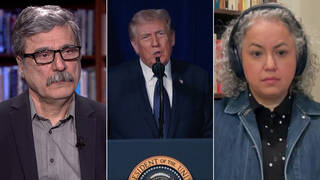
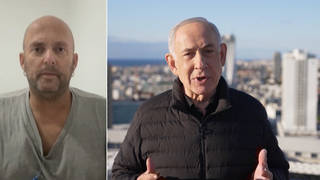
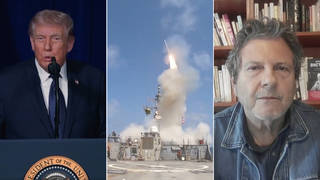
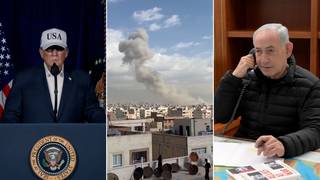




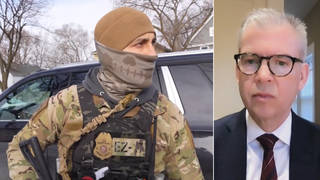
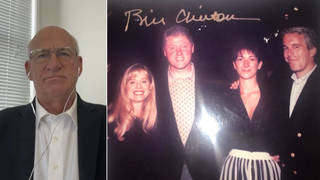
Media Options